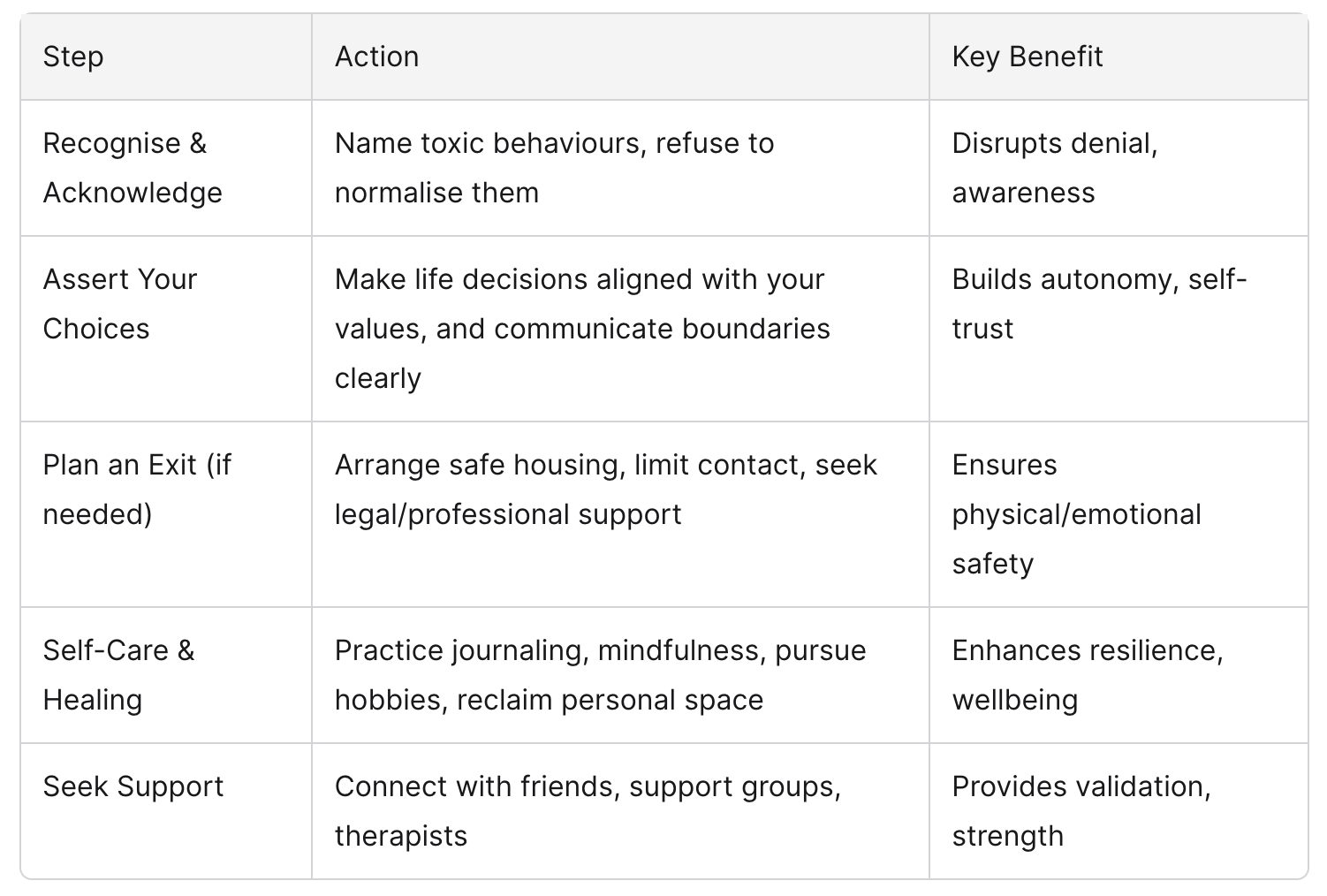Here’s the not-so-filmy truth: learning how to deal with toxic parents in India can feel like surviving an endless joint family drama—complete with surprise plot twists, dramatic monologues, and the expectation that you’ll be both the obedient hero and the sacrificial victim.
The bond runs deep, but facing a toxic parent, entrenched poisonous behaviour, and centuries of complex family dynamics would test even the most patient Bollywood saint.
Yet, don’t lose hope. This guide aims to help you strengthen your mental health, establish healthy boundaries, and rediscover your sense of self—without turning every family gathering into a scene from an Indian TV serial.
What Makes an Indian Parent “Toxic”?
A toxic parent isn’t just someone who grounds you for bad marks. In Indian, it stretches to chronic emotional manipulation, physical abuse, verbal put-downs ("Look at Sharma ji’s son!"), and a relentless need to control every aspect of your life.
From your career (doctor or engineer, of course) to your marriage (arranged, obviously), there’s often little room for a child’s self-expression, choices, or feelings.
But let’s not paint with too broad a brush—many parents mean well but are themselves bound by their upbringing, trauma, and societal pressure.
Typical Toxic Traits in Indian Families
- Constantly Judging: Comparing, criticising, and using hurtful words.
- Physical Abuse and Intimidation: Even today, “discipline” may cross the line into physically abusing or outright violence.
- Emotional Manipulation: Using guilt ("Your mother died for you!") or emotional withdrawal.
- Overly Controlling/Narcissistic Parenting: Not allowing children to make their own life choices, setting clear consequences for stepping out of line.
- Neglect: Dismissing a child’s feelings or needs
The Impact of Toxic Parenting on Mental Health
Short-Term Effects: The Immediate Emotional Price
Growing up with a toxic parent in India isn’t just “strict parenting”—it often means navigating a minefield of hurtful words, emotional manipulation, or even, in severe cases, physical abuse. In the short term, a child’s mental health can take a direct hit: anxiety becomes a constant companion, depression feels inescapable, and self-worth plummets under the weight of relentless criticism and unrealistic expectations.
The child may withdraw socially, become overly sensitive to judgment, or start associating love with conditional approval.
These children often develop unhealthy coping mechanisms—suppressing emotions, people-pleasing, or even emotional eating—to keep the peace at home.
.jpg)
The pressure to conform can be intense, especially when family reputation and collective well-being are held above the child’s own needs. Over time, this can escalate into more serious issues, including chronic stress, sleep disturbances, and impaired academic or social performance—signs that the toxic family environment is already shaping the child’s daily life and worldview.
Long-Term Effects: The Emotional Inheritance
The scars of toxic parenting in Indian families often outlast childhood, manifesting as chronic mental health conditions like PTSD, anxiety disorders, or even complex trauma.
The emotional manipulation or, worse, physical abuse experienced early on can rewire a child’s brain, making them hyper-vigilant to conflict, wary of intimacy, and prone to chronic low self-esteem.
Self-expression is frequently stifled, with many adults from such backgrounds struggling to voice their needs or pursue their own life choices—paralysed by the fear of disappointing their family or inviting “log kya kahenge?” (“What will people say?”). Setting boundaries becomes a Herculean task when guilt and obligation have been the currency of love for years.
In relationships, these individuals may repeat toxic patterns, tolerate emotional abuse, or struggle to maintain healthy relationships, mirroring the family dynamics they grew up with. The fear of judgment and deep-seated self-doubt can sabotage personal growth, career decisions, and even the ability to advocate for one’s own mental health needs.
Physical Health: The Body Pays the Price
Chronic psychological stress and exposure to physical health issues are closely linked. Research shows that children raised in toxic environments may face higher risks of weakened immunity, cardiovascular problems, and digestive disorders later in life.
The body’s stress response, constantly triggered by emotional or physical abuse, leads to wear and tear on the system—proving that emotional wounds are never just “all in the mind.”
Personal Growth and Identity: Rebuilding After the Storm
Perhaps the most insidious effect is the erosion of self-esteem and self-expression. Many adults from toxic Indian families report feeling “never good enough,” haunted by internalised negative messaging. The fear of making life choices outside the prescribed script—whether in career, marriage, or lifestyle—can feel overwhelming, sometimes leading to perfectionism, procrastination, or self-sabotage.
On the upside, awareness and healing are possible. With professional help, support networks, and self-care, it’s possible to break the cycle—learning to set healthy boundaries, speak up for one’s needs, and redefine what a “good child” (and a healthy adult) means beyond family expectations.
How to Identify a Toxic Parent
Signs You Might Be Dealing with a Toxic Parent
- Use of emotional abuse, name-calling or narcissistic abuse.
- Physically abusive or using physical intimidation as discipline.
- Emotional manipulation, guilt-tripping, or gaslighting (“Everything I do is for you!”).
- Over-involvement in your own life, choices, and even personal space.
- Dismissing your feelings, needs, or achievements, or setting the bar at the bare minimum.
Pro Tip: If you constantly feel anxious, judged, or guilty around your family members, it’s a red flag.
How to Deal with Toxic Parents
1. Set Healthy Boundaries: Respect Yourself, Keep the Peace
Why boundaries matter: In Indian families, where interdependence and emotional enmeshment are often the norm, the idea of setting boundaries can feel like inviting a lecture on “family first.” Yet, healthy boundaries aren’t about disrespect—they’re essential for your mental health and maintaining healthy relationships.
Types of boundaries to consider:
- Physical: Limit visits or calls if face-to-face interactions trigger stress. Create personal space—sometimes, even a room with a lock can be a sanctuary.
- Emotional: Decide what you’re comfortable sharing. You have a right to protect your emotions, even if relatives expect full transparency.
- Time-based: Politely decline invitations or reduce attendance at family gatherings. It’s okay to say, “I can only stay for an hour,” or skip events that drain you.
- Communication: Set rules around conversations. If certain topics (such as careers, marriage, or appearance) consistently lead to criticism, steer clear or change the subject.
How to set boundaries:
- Be clear and calm: Use “I” statements (e.g., “I feel overwhelmed when…” ) instead of accusatory language.
- Write it down: If confrontations lead to emotional outbursts, a heartfelt letter can bridge the gap, giving both sides time to reflect.
- Involve a neutral party: An uncle, aunt, or family friend—someone respected and fair—can help mediate, though tread carefully; not everyone understands the need for boundaries.
- Expect pushback: Indian parents may see boundaries as rejection. Stay firm but kind, reiterating your love and respect while protecting your emotional well-being.
Remember: Boundaries aren’t walls—they’re the rules of engagement that allow for a relationship that doesn’t erode your sense of self.
2. Limit Contact—When Necessary: Safety First
When to consider it: If interactions are consistently damaging, leading to emotional abuse, physical intimidation, or chronic stress, limiting contact isn’t betrayal—it’s self-preservation. This is especially critical if you face physical abuse, sexual abuse, or threats to your well-being.
How to do it sensitively:
- Gradual distancing: Reduce the frequency and duration of contact. Keep conversations neutral and surface-level to avoid conflict.
- Physical separation: If possible, move out or create physical distance. Even temporary separation can provide breathing room.
- Exit strategy: In extreme cases, prepare an exit plan. This might involve financial independence, secure housing, and a support network you can rely on.
- Legal and professional help: If you’re in danger, reach out to authorities, helplines, or NGOs specialising in family violence.
Cultural considerations: Indian society often stigmatises “abandoning” parents. Remind yourself that your safety and mental health come first—this isn’t about being a “bad child,” but about breaking cycles of abuse and protecting your future.
3. Prioritise Your Own Mental Health and Self-Care: Healing Is a Process
Acknowledge the impact: Growing up with a toxic parent leaves scars—low self-esteem, anxiety, depression, or even chronic mental health conditions. You’re not just “being too sensitive”—the effects are real and legitimate.

Self-care strategies tailored for Indian adults:
- Therapy: It’s becoming more accepted in India, and online platforms like MindPeers and TalkToAngel offer discreet, accessible options.
- Meditation and mindfulness: Practices like yoga, pranayama, or guided meditation can help manage stress and ground your emotions.
- Journaling: Write about your experiences, feelings, and progress. This can be a private space for self-expression and reflection.
- Support groups: Connect with others who’ve faced similar challenges. Shared stories can validate your feelings and offer practical advice.
You’re not alone: Seeking peace and personal growth doesn’t make you ungrateful. It’s an act of courage and self-respect.
4. Seek Professional Help: Breaking the Stigma
Why therapy? Mental health professionals can help you unpack years of emotional manipulation, narcissistic parenting, or trauma. Therapy isn’t just for “serious” issues—it’s for anyone wanting to build healthier relationships and self-worth.
Finding help in India:
- Government and NGO helplines: Many organisations offer free or low-cost counselling.
- Online therapy: Platforms like MindPeers and TalkToAngel provide privacy and flexibility.
- Specialised support: Look for therapists experienced in family dynamics, childhood trauma, or narcissistic abuse.
- Support groups: Some focus specifically on survivors of toxic family relationships, offering a safe space to share and heal.
Cultural barriers: It’s common to hear, “What will people say?” or “We don’t talk about these things.” Gently challenge these notions. Seeking help is a sign of strength, not shame.
5. Build a Support System: You Are Not an Island
Beyond “log kya kahenge?”Surround yourself with people who respect your journey—trusted friends, understanding relatives, or online communities. These connections can buffer the stress of a troubled parent-child relationship.
How to build your network:
- Lean on friends: Even one or two close confidants can make a world of difference.
- Extended family: Sometimes, a supportive aunt, cousin, or grandparent can offer perspective and comfort.
- Online communities: Facebook groups, Reddit forums, and WhatsApp support circles for adult children of toxic parents can provide anonymity and solidarity.
- Professional networks: Therapists, counsellors, and support groups are part of your support system too.
Cultural nuance: Indian families often expect loyalty to blood relations above all else. Remind yourself that chosen family—people who truly care for your well-being—counts just as much.
6. Practice Self-Expression and Assertiveness: Reclaim Your Voice
Why it matters: Toxic parents often stifle self-expression, making it hard to articulate your needs or desires. Reclaiming your voice is a crucial step in healing and building self-worth.
Ways to nurture self-expression:
- Creative outlets: Write, paint, dance, or cook—channel your emotions into something tangible.
- Honest conversations: Start small. Practice stating your preferences with friends before tackling more challenging conversations with family.
- Assertiveness training: Role-play scenarios with a therapist or trusted friend. Learn to say “no” without guilt.
- Affirmations: Counter negative messages with positive statements about your worth and right to happiness.
Cultural context: Indian children are often taught to prioritise harmony over individuality. But your feelings and needs matter. Expressing them isn’t rebellion—it’s authenticity.
Navigating Toxic Patterns and Family Dynamics in India
Dealing with Specific Types of Toxic Parents
The Narcissistic Parent
Narcissistic parents commonly display:
- A constant need for admiration
- Lack of empathy or concern for their child’s feelings
- Manipulativeness—using guilt, blame, or emotional blackmail
- Intense reaction to criticism, often treating any feedback as an attack
Children raised by narcissistic parents in Indian families may experience:
- Low self-esteem due to constant criticism or unattainable expectations
- Perfectionism or chronic self-doubt, as acceptance is often conditional.
- Difficulty trusting others or forming secure relationships, having learned early that love is tied to performance or obedience.
- Guilt and shame used as control tools, leading to suppressed self-worth and emotional confusion.
These issues are compounded when cultural and social structures enable narcissistic behaviour or rationalise it as “discipline” or “for your own good”.
The Physically Abusive or Overly Needy Parent
Physical abuse and emotional over-dependence are also significant toxic patterns in Indian families:
- Abuse may take the form of slapping, beating, yelling, or physical intimidation, often normalised as “tough love” or “discipline.”
- Overly needy parents might rely excessively on their child for emotional support or validation, blurring healthy boundaries and roles.
Recognising that these behaviours have roots in generational trauma is not an excuse—it’s a starting point for breaking the cycle. Children of such parents are at high risk for:
- Chronic anxiety, PTSD, depression
- Reluctance to set boundaries or seek independence
- Struggles with asserting their own choices
- Perpetuating similar behaviours in the next generation.
When abuse—especially physical or sexual—is present, immediate steps such as limiting contact, ensuring safety, and seeking legal/professional help are imperative.
Practical Self-Care and Healing Tips
Journaling
Documenting experiences, feelings, and critical remarks empowers self-reflection. Use your journal to process hurtful words, name-calling, and self-doubt—then counter them with affirming truths. This practice builds inner strength and clarifies your feelings versus your parents’ narratives.
Mindfulness and Meditation
Regular mindfulness, deep breathing, or meditation helps manage anxiety and emotional pain triggered by toxic interactions. Traditional Indian practices like yoga or pranayama can also restore inner balance.
Personal Growth Activities
- Take classes to learn new skills or hobbies, boosting confidence beyond the family sphere.
- Pursue interests that improve your self-worth and highlight your unique strength and identity.
Create Physical Space
- If moving out isn't feasible, carve out “safe zones” or alone time within your current environment.
- Physically distancing yourself when emotions escalate can prevent further harm and give you mental bandwidth to heal.
Common Myths About Dealing with Toxic Parents

Conclusion
Navigating toxic patterns and complex family dynamics in India is challenging—but reclaiming your sense of safety, dignity, and happiness is possible. Recognise harmful behaviours, protect your boundaries, and reach out for support. Healing is not betrayal; it’s an act of courage and compassion for yourself and future generations.
Take the Next Step Towards Healing
If you’re looking for a supportive, judgement-free space to care for your mental health, platforms like Rocket Health offer confidential access to experienced professionals and support groups. Break the stigma.

-p-500.png)
.png)




